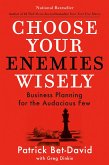You're here because you want more than just an ideayou want a money-making business that can take your life to the next level. This isn't about pie-in-the-sky dreams or waiting for the perfect opportunity to fall into your lap. No, this is about getting intentional, getting strategic, and getting paid.
You see, choosing the right business idea is about understanding what works for you. It's not just about what's trending or what everyone else says is the next big thing. You need an idea that aligns with your strengths, plays to your skills, and hits that sweet spot between passion and profit. It's time to do some real digging and, quite frankly, stop wasting time on ventures that don't have staying power.
Now, I'm not going to tell you it's easy. If you're serious about thisand I know you areyou've probably got several ideas in your head already. But how do you know which one is going to be the game-changer? Which one is worth the energy, the investment, and the time? That's what we're going to figure out, together.
Identifying What You Bring to the Table
First things firstyou need to take stock of your skills, talents, and experiences. Don't sleep on this step. Too many people rush into business ideas without fully understanding what they're working with. And here's the thing: if you don't know what you're good at, how can you choose the right business? You can't.
You might be thinking, "But what if I don't have any standout skills?" Wrong. You've got skills; they're just not always the kind you immediately think of. Maybe you're a great communicator, you know how to build rapport with people, or you have a knack for spotting gaps in the market that others miss. Those are valuable assets, and they play a huge role in determining which business idea you should pursue.
Take a moment to think about what you're naturally drawn to. What kind of work makes you lose track of time? What do people often compliment you on? If you're not sure, ask yourself this: What do people come to you for? Chances are, the answers to those questions are going to point you in the direction of your strengths.
Knowing What the Market Wants
It's not enough to know what you're good at; you've got to know if people are willing to pay for it. That's where market research comes in. And I'm not talking about getting lost in a Google search for hours. I mean real, actionable research that helps you see what's hot, what's not, and where you can fit in.
You need to get out there and understand your potential customers. Who are they? What are their pain points? How are they currently solving their problems? If you can pinpoint these issues, you'll have a much better idea of how your business can provide the solution. Don't assume that just because you love an idea, other people will throw money at it.
Look for industries that are growing, not shrinking. Follow the money. If there's a sector that's consistently seeing growth, there's probably an opportunity for you to break into it. And while you're at it, keep an eye on the competition. I'm not saying copy what they're doing, but study them. Look at what's working for them and, more importantly, what's not. That's how you figure out where the gaps are and how you can do it better.
I've seen too many people dive headfirst into a business without fully understanding the financials, only to hit a wall six months later because they ran out of money. Don't let that be you. Before you commit to any idea, you need to get real about what it's going to take to get it off the ground.
I'm talking hard numbers herehow much will it cost to start? What are the monthly expenses? What's the projected income? If you can't answer these questions, you're not ready to move forward yet.
You see, choosing the right business idea is about understanding what works for you. It's not just about what's trending or what everyone else says is the next big thing. You need an idea that aligns with your strengths, plays to your skills, and hits that sweet spot between passion and profit. It's time to do some real digging and, quite frankly, stop wasting time on ventures that don't have staying power.
Now, I'm not going to tell you it's easy. If you're serious about thisand I know you areyou've probably got several ideas in your head already. But how do you know which one is going to be the game-changer? Which one is worth the energy, the investment, and the time? That's what we're going to figure out, together.
Identifying What You Bring to the Table
First things firstyou need to take stock of your skills, talents, and experiences. Don't sleep on this step. Too many people rush into business ideas without fully understanding what they're working with. And here's the thing: if you don't know what you're good at, how can you choose the right business? You can't.
You might be thinking, "But what if I don't have any standout skills?" Wrong. You've got skills; they're just not always the kind you immediately think of. Maybe you're a great communicator, you know how to build rapport with people, or you have a knack for spotting gaps in the market that others miss. Those are valuable assets, and they play a huge role in determining which business idea you should pursue.
Take a moment to think about what you're naturally drawn to. What kind of work makes you lose track of time? What do people often compliment you on? If you're not sure, ask yourself this: What do people come to you for? Chances are, the answers to those questions are going to point you in the direction of your strengths.
Knowing What the Market Wants
It's not enough to know what you're good at; you've got to know if people are willing to pay for it. That's where market research comes in. And I'm not talking about getting lost in a Google search for hours. I mean real, actionable research that helps you see what's hot, what's not, and where you can fit in.
You need to get out there and understand your potential customers. Who are they? What are their pain points? How are they currently solving their problems? If you can pinpoint these issues, you'll have a much better idea of how your business can provide the solution. Don't assume that just because you love an idea, other people will throw money at it.
Look for industries that are growing, not shrinking. Follow the money. If there's a sector that's consistently seeing growth, there's probably an opportunity for you to break into it. And while you're at it, keep an eye on the competition. I'm not saying copy what they're doing, but study them. Look at what's working for them and, more importantly, what's not. That's how you figure out where the gaps are and how you can do it better.
I've seen too many people dive headfirst into a business without fully understanding the financials, only to hit a wall six months later because they ran out of money. Don't let that be you. Before you commit to any idea, you need to get real about what it's going to take to get it off the ground.
I'm talking hard numbers herehow much will it cost to start? What are the monthly expenses? What's the projected income? If you can't answer these questions, you're not ready to move forward yet.
Dieser Download kann aus rechtlichen Gründen nur mit Rechnungsadresse in A, B, CY, CZ, D, DK, EW, E, FIN, F, GR, H, IRL, I, LT, L, LR, M, NL, PL, P, R, S, SLO, SK ausgeliefert werden.









